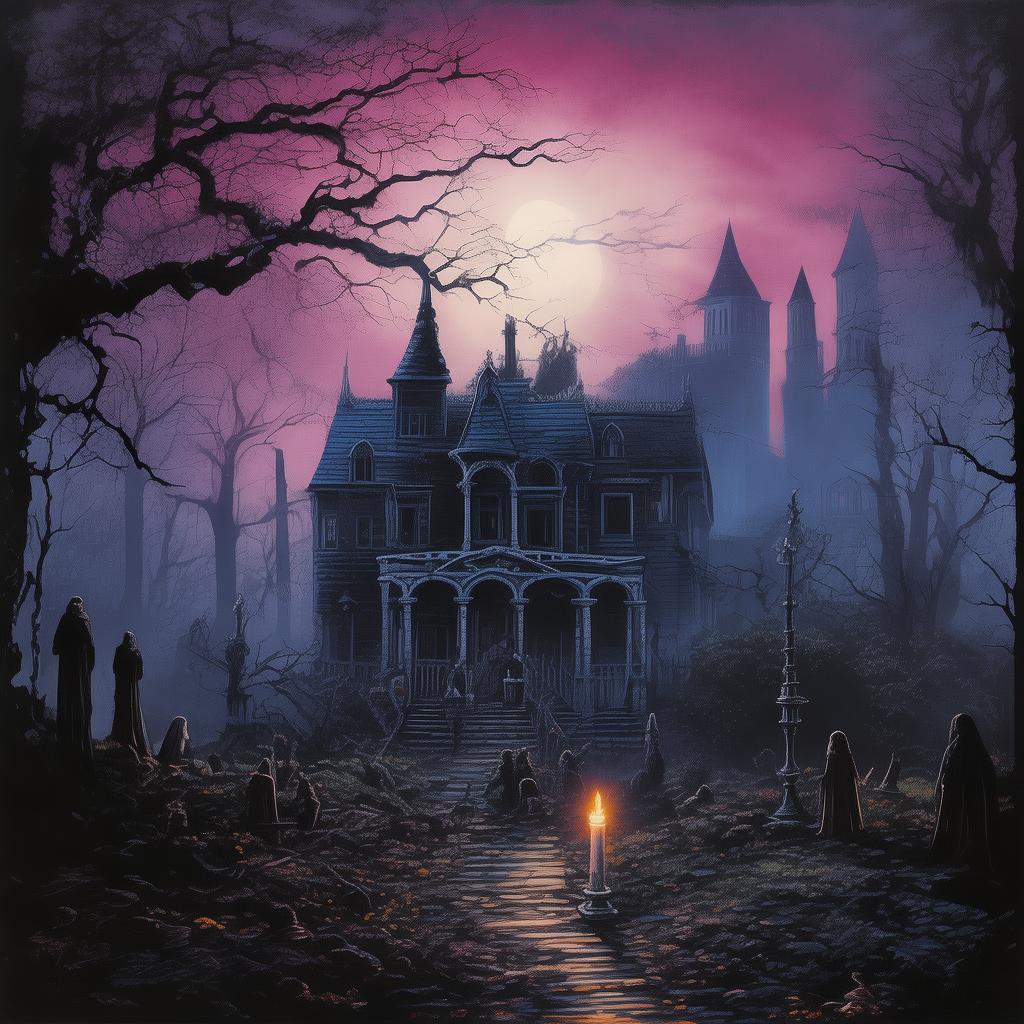The Veil-Bound Lament
In the heart of an ancient, forgotten village, nestled among the whispering cedars and shadowed by the perpetual mist, there stood an old, dilapidated mansion known to the locals as the Veil House. It was said that the mansion had once been the pride of the village, a beacon of wealth and joy, until a tragic event unfolded within its walls. The story of the Veil House had been whispered for generations, a tapestry of sorrow and mystery that had long since faded into legend.
In the 22nd century, a young man named Liang, who had grown up with tales of the Veil House, moved to the village with his family. Little did he know that his arrival would unravel a century-old enigma and draw him into a world where the living and the dead coexisted in a delicate balance.
Liang was an artist, his hands capable of capturing the beauty of the natural world in ways that few could match. His soul was as delicate as his brushstrokes, sensitive to the whispers of the wind and the secrets of the earth. It was this sensitivity that led him to the Veil House, a place that called to him like a siren in the night.
The mansion was abandoned, its windows shattered and its doors hanging askew. Liang, driven by curiosity and a desire to understand the past, ventured inside. The air was thick with the scent of decay and the silence was punctuated by the creaking of ancient wood and the distant howls of wild animals.
As he explored the house, Liang found a small, ornate box hidden beneath a loose floorboard in the attic. Inside, he discovered a collection of letters, each one written by a woman named Mei, a woman who had once lived in the mansion. The letters were filled with love, longing, and a haunting sense of loss.
Liang began to read the letters, and as he did, he felt a strange connection to Mei. She spoke of a love that had transcended death, a love that had been torn apart by a fate that was as tragic as it was mysterious. Mei had written of a man, her beloved, who had disappeared without a trace, leaving her to grieve in solitude.
As Liang read, he realized that Mei's beloved was none other than his own great-grandfather. The revelation was shattering. Liang's ancestors had been the family that had once owned the Veil House, and Mei was the woman who had loved his great-grandfather with all her heart.
The connection between Liang and Mei was not just one of blood, but one of spirit. As he delved deeper into the letters, Liang felt the weight of Mei's sorrow and the depth of her love. He also felt the pull of the Veil, a mysterious force that seemed to bind him to the mansion and to Mei's unrequited love.
One night, as Liang lay in bed, he felt a cold hand brush against his cheek. He opened his eyes to see a woman standing at the foot of his bed, her face obscured by the shadows. She spoke to him in a voice that was both familiar and haunting, "Liang, you must help me break the curse that binds me to this place."

Liang was scared, but he was also determined. He knew that Mei's story was his story, and that to save her, he must confront the truth about his own family's past. He began to research the Veil House and the events that had led to Mei's untimely end.
He discovered that Mei's beloved had been accused of a crime he did not commit. In a fit of despair, he had taken his own life, leaving Mei to die of a broken heart. The curse that had been placed upon the Veil House was a result of the injustice done to Mei and her beloved.
Liang knew that to break the curse, he must confront the ghost of his great-grandfather and seek redemption for the past. He made a pact with Mei, promising to clear his great-grandfather's name and to ensure that her love would be remembered and honored.
The journey was fraught with danger and uncertainty. Liang had to navigate the treacherous terrain of his family's history, confront the ghosts of the Veil House, and face the truth about his own identity. Along the way, he discovered that the Veil House was not just a place of sorrow, but a place of hope and redemption.
In the end, Liang succeeded in breaking the curse. Mei's spirit was freed, and her love was finally recognized. Liang's great-grandfather was exonerated, and the Veil House was no longer a place of dread, but a testament to the enduring power of love and the possibility of redemption.
As the final rays of the setting sun bathed the Veil House in a golden glow, Liang stood outside the mansion, his heart filled with gratitude and a newfound sense of purpose. He had faced the past, confronted the ghosts that haunted him, and emerged a stronger man.
The Veil House, once a symbol of sorrow, had become a beacon of hope. And as Liang walked away, the village behind him, he knew that the story of the Veil House and the love between Mei and his great-grandfather would be told for generations to come, a tale of love, loss, and redemption that would never fade.
✨ Original Statement ✨
All articles published on this website (including but not limited to text, images, videos, and other content) are original or authorized for reposting and are protected by relevant laws. Without the explicit written permission of this website, no individual or organization may copy, modify, repost, or use the content for commercial purposes.
If you need to quote or cooperate, please contact this site for authorization. We reserve the right to pursue legal responsibility for any unauthorized use.
Hereby declared.









